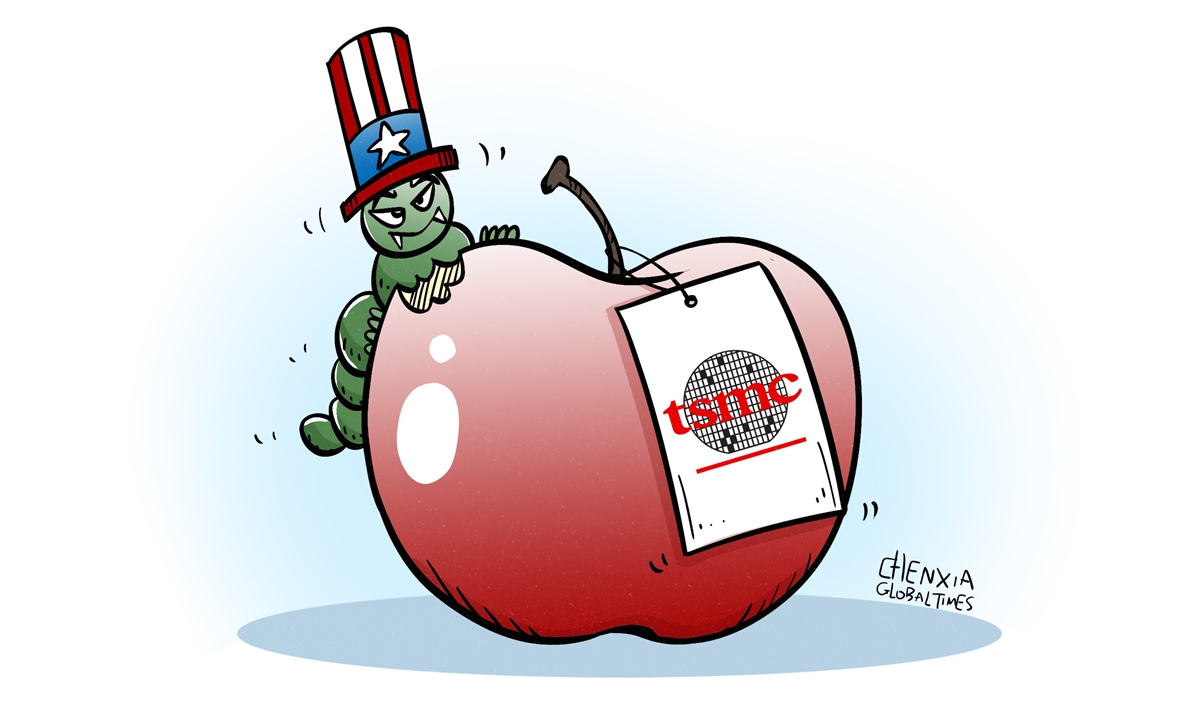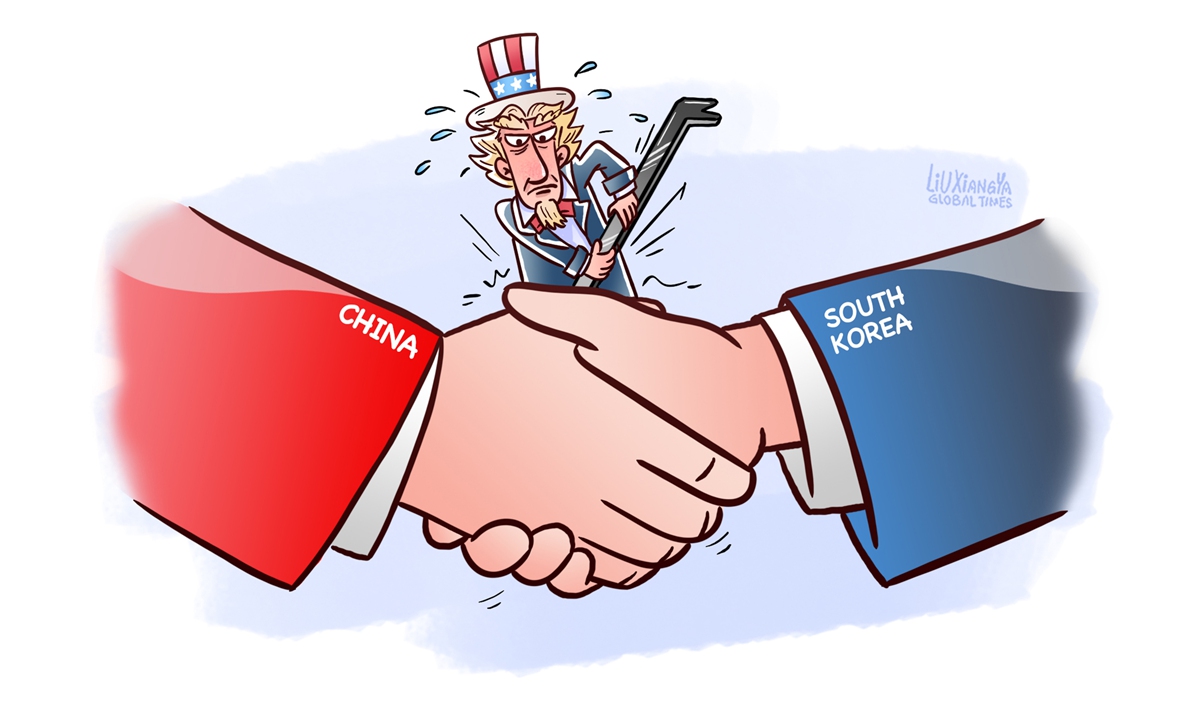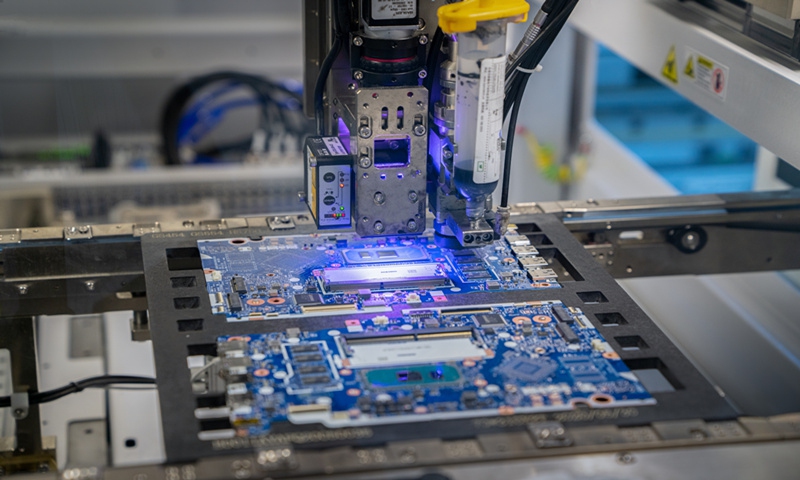
Illustration: Chen Xia/Global Times
Taiwan Semiconductor Manufacturing Co (TSMC)'s chip plant in Kumamoto Prefecture in Japan expects to reach 60 percent local procurement by 2030, TSMC Chief Executive Officer C.C. Wei said during a meeting with Japanese Prime Minister Fumio Kishida on Saturday, Bloomberg reported.TSMC's ambition of localizing procurement in Japan bears a strong imprint of the geopolitical drive by the US to divide the Asian and global semiconductor industry chains. If TSMC's Japanese factory keeps moving in this wrong direction of "decoupling," its sustainability will be in question.
TSMC's production complex in Kumamoto, which became operational in February, is the first plant in Japan for the world's top contract chip manufacturer. According to Japanese media outlet Nikkei, Japan plans to provide subsidies of more than 1.2 trillion yen ($7.9 billion) for this project. Additionally, TSMC is planning to launch a second plant in Japan that will produce advanced 6-nanometer chips by the end of 2027.
TSMC's plan to build plants in Japan is only part of a broader global strategy. The company has been building a plant in the US state of Arizona, and it is also reportedly planning to build its first European plant in Germany. Compared with its plans in the US and Europe, its progress in Japan has been relatively smooth due to fewer problems such as a lack of specialized labor.
TSMC's production layout in Japan, Europe and other places is actually very costly. Although the US, Europe and Japan all seem willing to subsidize and attract TSMC to build chip factories in order to revitalize their domestic chip manufacturing industries, considering the current lag in chip manufacturing in these economies, it will be difficult to boost chip manufacturing by solely depending on a single company like TSMC.
Moreover, there is an even bigger problem in all the chip manufacturing ambitions of the US, Europe and Japan - political interference by the US to divide the global and Asian semiconductor industrial chains.
For example, TSMC's ambition for localization in Japan seems to be seriously affected by the political interference of the US in the global semiconductor supply chain, and is sliding toward "decoupling." This is an extremely dangerous trend.
From coercing other countries to impose restrictions on the export of high-end chips and production equipment to China to pressuring other countries to cut off their semiconductor supply chain cooperation with China, the blatant US chip war against China has already caused too much damage to cooperation and development in the global chip industry.
If TSMC's and Japan's cooperation continues to succumb to US political pressure, blindly emphasizing the "geopolitical" and "economic security" factors of the projects, and further cooperating with the US semiconductor "decoupling" plan against China, then the sustainability of the projects will face great uncertainty.
If TSMC's Japanese factory achieves 60 percent local procurement, coupled with the use of US machinery and equipment, it will significantly deviate from the efficient and cost-effective supply chains of the Taiwan island and the Chinese mainland, which will greatly increase TSMC's Japanese production costs and reduce its competitiveness.
Even if TSMC's Japanese factories can significantly increase output, they will still face challenges in finding markets under the pressure of the US chip war against China.
It is a reasonable concern that when the originally mutually beneficial semiconductor supply chain in Asia is artificially divided into two by the US - that is, separated from the industrial chain and market in the Chinese mainland - even if TSMC's performance improves in the short term, this growth is bound to be unsustainable, because the share of the mainland chip market in the global semiconductor sector can't be - and shouldn't be - ignored.
Due to China's strong advantages in emerging industries - artificial intelligence, autonomous driving, and electric vehicles, among others - and innovative technology applications, the demand for chips in the vast Chinese mainland market will continue to grow. If TSMC and Japan's chip-related industries are swayed by the misguided US "decoupling" push, they will definitely miss out on the opportunities in the Chinese mainland market.
Can TSMC's projects in Japan eliminate the pressure of "decoupling" from the US, achieve a win-win and multi-win situation, and deepen semiconductor industry chain cooperation in Asia? If so, both the Japanese chip industry and TSMC will face bright prospects. It is hoped that Japan's chip ambitions and the establishment of TSMC's factory in Japan will not go in the wrong direction of "decoupling." For the chip sectors in Japan and China's Taiwan region, depoliticization is the only correct strategy.
The author is a reporter with the Global Times. bizopinion@globaltimes.com.cn



